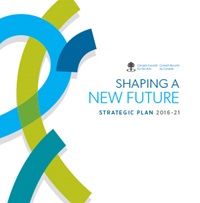April 29, 2016 – The last week saw two major announcements which are bound to change the arts and culture landscape in Canada. Over the weekend, the Minister of Canadian Heritage announced a major consultation on Canadian Content in a Digital World. Then, the Canada Council for the Arts released its 2016-2021 strategic plan.
Shaping a new future
 Let’s begin with the Canada Council. This strategic plan is no ordinary plan. First, it will guide the Council as it rolls out the $180 million investment announced in the 2016 federal budget. Second, it lays out the strategies that will underlie the New Funding Model. Third, in addition to reaffirming its support to artists and arts organizations (88% of the new parliamentary credits will go to grants and contributions), the Council introduces three new strategic commitments:
Let’s begin with the Canada Council. This strategic plan is no ordinary plan. First, it will guide the Council as it rolls out the $180 million investment announced in the 2016 federal budget. Second, it lays out the strategies that will underlie the New Funding Model. Third, in addition to reaffirming its support to artists and arts organizations (88% of the new parliamentary credits will go to grants and contributions), the Council introduces three new strategic commitments:
- Renew the relationship between Indigenous artists, and Indigenous and non-Indigenous audiences, for a shared future
- Raise the international profile of Canadian art and artists
- Amplify the quality, scale and sharing of Canadian art through digital technology
The commitments to Indigenous artists and to international promotion are excellent news from the perspective of recent partnerships and collaboration between CAPACOA, the Indigenous Performing Arts Alliance and CINARS. The commitment to a digital strategy is a timely news that coincides with a major undertaking at Canadian Heritage.
Overhauling cultural policies
 Heritage Minister Mélanie Joly announced the launch of public consultations on Canadian content creation, discovery and export in a digital world. Her aim is to bring Canada’s cultural policies – everything from the Broadcast Act to the CRTC – into the digital age. “Everything is on the table,” she said.
Heritage Minister Mélanie Joly announced the launch of public consultations on Canadian content creation, discovery and export in a digital world. Her aim is to bring Canada’s cultural policies – everything from the Broadcast Act to the CRTC – into the digital age. “Everything is on the table,” she said.
Cultural content may feel like a remote topic to the performing arts community, but it’s not. This consultation isn’t only about Canadian content and cultural industries. The drivers of change highlighted in the pre-consultation paper affect the entire arts and culture ecosystem. Digital content consumers are getting accustomed to personalized content that is instantaneously accessible, free (or at low-cost), and mobile. This is tough competition for artistic disciplines that require a specific time commitment, presence in a physical venue, and a relatively onerous financial transaction (come to think of it, the “convenience fees” alone for online ticketing can be almost as high as a monthly Netflix subscription).
This consultation is a once-in-a-decade opportunity to shape federal cultural policy. We urge you to take time to participate. The pre-consultation ends May 20.
- Read the pre-consultation paper;
- Read the pre-consultation questionnaire;
- Take the pre-consultation questionnaire;
- Connect with us so we can benefit from your insights.
Frédéric Julien
Director of Research and Development, CAPACOA
Co-president, Canadian Arts Coalition
Recent and Related News
Where Does Audience Research Takes Us Next?
Changes in Favour of Efficiency, Transparency and Trust at Canadian Heritage



